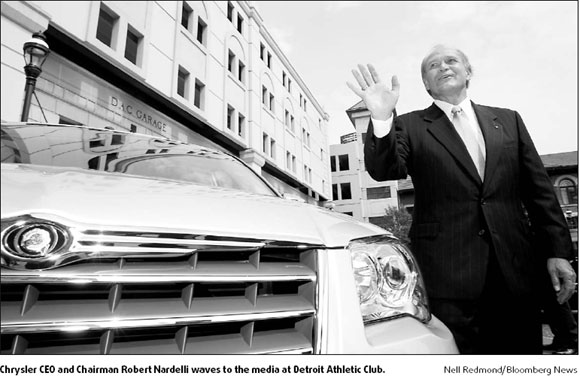Zero hour looms on Chrysler contract
Chrysler LLC has been given until today to reach an agreement on a new contract with the United Auto Workers or face a possible strike, people familiar with the negotiations said.
The automaker's previous contract had been extended since September 14 while the UAW concentrated on negotiations with General Motors Corp. On September 26, GM and the union reached a settlement that the UAW is using as a model in the Chrysler talks.
The union on Saturday gave Chrysler 72 hours notice that it is terminating further extensions, after which a strike is possible, the people said. The UAW employed a similar strategy in the GM talks before staging its first national walkout at the automaker in 37 years. Following a two-day strike, a tentative agreement was announced.

"At GM, the UAW established what it wants as a pattern," said Dan Luria, an analyst at the Michigan Manufacturing Technology Center in Plymouth. "By canceling the extension, the union is saying, 'Don't waste our time'."
The two sides continued meeting on Sunday and were making progress toward a settlement, the people said.
UAW President Ron Gettelfinger decided two days ago to delay negotiations with Ford Motor Co to focus on Chrysler, the third-largest US-based automaker, three people familiar with the situation said.
At Chrysler, Gettelfinger is seeking job guarantees similar to those at GM, which assured future work for at least 55 of 82 unionized plants in the United States, Luria said .
The talks are being held at Chrysler's Auburn Hills, Michigan, headquarters, company spokeswoman Michele Tinson said. She declined further comment. Roger Kerson, a UAW spokesman, didn't return calls seeking comment.
New owner
At Chrysler, Gettelfinger is bargaining with a new private-equity owner and a chief with two months' experience in the industry. Former Home Depot Inc Chief Executive Officer Robert Nardelli, 59, joined Chrysler in August after Cerberus Capital Management LP bought the automaker from the former DaimlerChrysler AG of Germany.
"Cerberus hasn't done a thing that should cause concern for the UAW," said John Casesa, managing partner at Casesa Strategic Advisors LLC in New York. "They bought the company, hired new management and said they're going to spend money for new products. What more could the union ask for?"
The highlight of the GM contract is GM's commitment to shed $50 billion in retiree healthcare obligations by putting $29.9 billion into a union-run retiree-health fund.
In its contract, GM agreed to stop sending new work to outside suppliers. The automaker, in turn, will pay less to new employees, meaning labor costs will decline as current factory workers retire.
GM, Ford and Chrysler have said retiree health costs are part of the reason they must pay $25 to $30 more an hour for American factory workers than Toyota Motor Corp and Honda Motor Co pay at their US plants.
Chrysler and Ford were both unprofitable last year and will use the talks to cut costs and become more competitive against overseas automakers. Chrysler had a loss of $680 million, while Ford, based in Dearborn, Michigan, posted a record deficit of $12.6 billion.
Workers are voting on the GM contract through tomorrow. As of Friday, about four locals were voting in favor for every one that rejected it.
The UAW typically seeks to use the contract with the first US automaker as a template for the other two.
Cerberus, which paid $7.4 billion for its 80.1 percent stake in Chrysler, wants to concentrate its investments on boosting revenue sources.
The automaker may also be reluctant to follow GM in providing specific job guarantees as such a pledge may hamper the overhaul of its US operations. Chrysler is eight months into a three-year plan that includes job cuts.
In August, Chrysler proposed selling or closing at least two non-automaking units, people familiar with the negotiations said at the time.
Bloomberg News
(China Daily 10/09/2007 page15)














